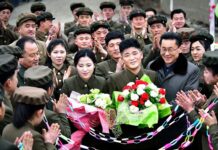Following the closure of Kaesong Industrial
Complex [KIC] and South Korea pulling the plug on the park’s power supply, no small number of citizens in the affected area are expressing regret over the incident and the
loss of a positive force in their lives, Daily NK has learned.
On the 23rd, our Daily NK reporter spoke with
a source in North Hwanghae Province who informed us that following the
withdrawal of the South from Kaesong, workers and their families, along with
local residents, are “wishing it hadn’t come to this.” Those who had, until
recently, been employed at the complex, and their families who had reaped the
benefits by extension, cannot shake the feelings of sadness and regret as they
recall happier times when they worked together, he said.
Some of these stakeholders still cling to
hope, habitually returning to look for signs of life around the industrial
park, but without any hope of a change in sight, “can do nothing but uselessly
stare at an abandoned [joint venture] before turning around and going back home
again.”
The rest of their time is mostly filled by
Party cadres from the provincial and city levels affiliated with the complex.
These officials have been gathering both former workers and ordinary citizens
several times a day to hold propaganda sessions premised on cementing animosity
toward the South, but our sources indicate that these sessions are ineffective,
and the harder the Party cadres push the “blame the puppet-government in the
South” narrative, the harder it becomes for its recipients to “suppress their
incredulous snorts.”
“People around Kaesong know better than
anyone that the reason the South closed Kaesong is because they were nervous
about the rocket launch and nuclear test; they just presume that in the end the
South became exasperated and decided to pull out,” the source pointed out.
“When the South pulled out, we were left
with nothing but darkness,” he said, as relayed to him in a conversation with
one despondent resident in the area.
Added a different source in North Hwanghae
Province close to the issue, “Party propaganda cannot override the goodwill
amassed by the workers towards their Southern colleagues that was born of
ten years of contact with our brethren from ‘the neighborhood below [South
Korea].’”
Workers from the complex, and their
families, feel grateful towards the South for supporting their livelihoods
during that time, she said, and cannot brush off these feelings. Even residents
of the area recognize that although the water and electricity may have been cut
off to the area now, during the time Kaesong was operational, they lived in
relative luxury–a “golden decade,” many called it– compared to people in
other areas.
Their fate still in the balance, the former
KIC workers have spent any time not devoted to informed nostalgia or state
propaganda to airing their grievances together, with particular focus on the
regime’s inability, unwillingness, or likely both to mitigate the fallout from
KIC’s closure–at the very least for those most directly affected. These
conversations often turn to talk of war, not just for former KIC workers, but
all North Koreans, who broadly view the KIC’s operational status as the state
of inter-Korean relations writ large.
The years of collaboration with and
affinity for the South experienced by the KIC labor force leads most residents
to speculate that “if a war does break out after this, 80-90% of the workers
previously tied to Kaesong would flee south immediately,” she concluded.



















